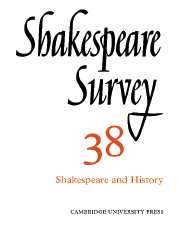Book contents
- Frontmatter
- Shakespeare’s History Plays: 1952–1983
- Shakespeare and History: Divergencies and Agreements
- Shakespeare’s Georgic Histories
- The Nature of Topicality in Love’s Labour’s Lost
- The Tragic Substructure of the Henry IV Plays
- Hal and the Regent
- The Rite of Violence in I Henry IV
- The Fortunes of Oldcastle
- Hand D in Sir Thomas More: An Essay in Misinterpretation
- Livy, Machiavelli, and Shakespeare’s Coriolanus
- Henry VIII and the Ideal England
- The Strangeness of a Dramatic Style: Rumour in Henry VIII
- ‘Edgar I Nothing Am’: Figurenposition in King Lear
- ‘Very like a whale’: Scepticism and Seeing in The Tempest
- Shakespeare’s Medical Imagination
- Shakespeare in the Theatrical Criticism of Henry Morley
- Shakespeare Performances in Stratford-upon-Avon and London 1983–4
- The Year's Contributions to Shakespearian Study 1 Critical Studies
- 2 Shakespeare’s Life, Times and Stage
- 3 Editions and Textual Studies
- Index
The Year's Contributions to Shakespearian Study 1 - Critical Studies
Published online by Cambridge University Press: 28 March 2007
- Frontmatter
- Shakespeare’s History Plays: 1952–1983
- Shakespeare and History: Divergencies and Agreements
- Shakespeare’s Georgic Histories
- The Nature of Topicality in Love’s Labour’s Lost
- The Tragic Substructure of the Henry IV Plays
- Hal and the Regent
- The Rite of Violence in I Henry IV
- The Fortunes of Oldcastle
- Hand D in Sir Thomas More: An Essay in Misinterpretation
- Livy, Machiavelli, and Shakespeare’s Coriolanus
- Henry VIII and the Ideal England
- The Strangeness of a Dramatic Style: Rumour in Henry VIII
- ‘Edgar I Nothing Am’: Figurenposition in King Lear
- ‘Very like a whale’: Scepticism and Seeing in The Tempest
- Shakespeare’s Medical Imagination
- Shakespeare in the Theatrical Criticism of Henry Morley
- Shakespeare Performances in Stratford-upon-Avon and London 1983–4
- The Year's Contributions to Shakespearian Study 1 Critical Studies
- 2 Shakespeare’s Life, Times and Stage
- 3 Editions and Textual Studies
- Index
Summary
To begin with, Rome, and two worthwhile books, Howard Erskine-Hill’s The Idea of Augustus in English Literature and Robert S. Miola’s Shakespeare’s Rome. Erskine-Hill devotes only one chapter to Shakespeare, but the entire first half of his book is of interest to Shakespearians. It begins with a lucid and well-substantiated account of Augustus and his Rome, derived not only from classical but also from twentieth-century historians, and then traces the response of patristic, medieval, and European Renaissance writers, especially Bodin, Machiavelli, and Lipsius. Shakespeare himself is introduced by way of Donne and the satirists, and – interestingly – the Ben Jonson of The Poetaster and the royal entry entertainment of the Temple of Janus (1604). Parts of Erskine-Hill’s account will be familiar to scholars, but the overall grasp is impressive: thorough scholarship, presented through a sturdy structure of argument, yields a great deal of significant information in a readily accessible form. Ideas of Rome’s Augustan age, Erskine-Hill shows, ‘have been a presence in English in all periods, reaching back even to the circle of King Alfred’, but more importantly, we should note, a pattern of fairly stable associations concerning Augustus ‘had been fully assembled by the sixteenth century’.
- Type
- Chapter
- Information
- Shakespeare Survey , pp. 215 - 225Publisher: Cambridge University PressPrint publication year: 1986

